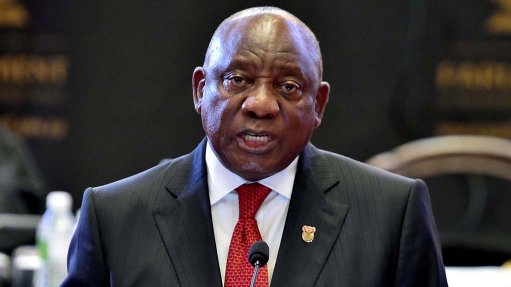
President Cyril Ramaphosa
Ten opposition parties, currently represented in Parliament, have petitioned President Cyril Ramaphosa to not sign into law the Electoral Matters Amendment Bill, on the grounds that it is unconstitutional.
The Electoral Matters Amendment Bill was passed by the National Council of Provinces (NCOP) last week and sent to Ramaphosa for assent.
The Bill is a sequel to the Electoral Amendment Act that was passed last year to provide for independent candidates to stand for election in Parliament and provincial legislatures.
It provides for the regulation of the private and public funding of independent candidates and independent representatives, among other things.
Non-governmental organisation My Vote Counts made submissions to Parliament, arguing that, in its current form, the Bill is “unconstitutional, and undermines” the Constitution in respect of transparency and accountability in political party funding legislation.
Other civil society organisations are also calling for the Bill to be reviewed.
The political parties that have petitioned Ramaphosa include the African Christian Democratic Party, the African Transformation Movement, the Congress of the People, the Democratic Alliance (DA), the Freedom Front Plus, GOOD Party, the Inkatha Freedom Party, the National Freedom Party, the Pan Africanist Congress of Azania and the United Democratic Movement.
“If the President assents to the Bill we would then be forced to join those in civil society, who have already given notice of their intention to approach the courts, to oppose this legislation on the grounds of unconstitutionality,” said the parties.
The Multi-Party Coalition explained that the Bill was “hastily” approved by the National Assembly, and then by the NCOP and includes contentious and substantive changes to the Political Party Funding Act which were not consequential to the inclusion of independent candidates.
“The substantive, and unnecessary, amendments to the Political Party Funding Act included a change to the implementation of Sec 236 of the Constitution which requires that represented political parties receive public funding on an ‘equitable and proportional basis’ in order to enhance multi-party democracy,” said the opposition parties.
The Multi-Party Coalition highlighted that the African National Congress “opportunistically” used the need for consequential changes to be made to the electoral system to substantially increase their public funding by 25%, based on current representation.
This is achieved at the expense of all of the opposition parties, except the DA which would also receive an increase of about 10% in public funding, they argued.
“Despite the benefit of a proposed increase the DA joins us in challenging the Bill’s constitutionality. We have submitted to the President that this does not enhance multi-party democracy but undermines it,” they explained.
The parties have also submitted to the President that, in its haste to pass this legislation, Parliament has failed to meet the constitutional duty to facilitate meaningful and reasonable public consultation.
Civil society has argued the same.
Opposition parties noted that with the national elections eight weeks away, parties are all committed to contesting without disrupting or delaying the election timetable.
“However, it is our duty as currently represented parties to protect the constitutional imperative of enhancing a multi-party democracy in the face of this existential threat to one of democracy’s greatest strengths,” it said.
The opposition parties called on Ramaphosa to refers those parts of the Bill which make substantive amendments to current legislation to the next Parliament for proper and constitutionally compliant consideration.